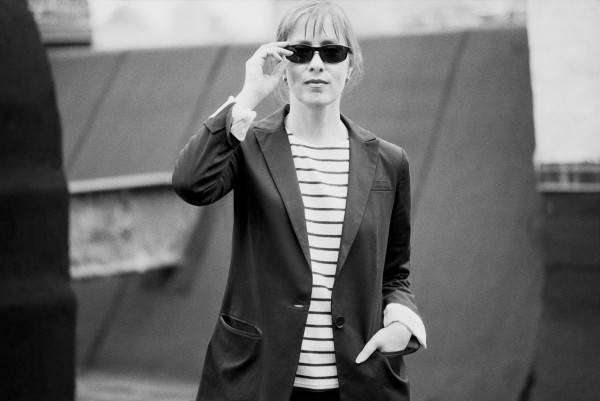A CHAT WITH: SUZANNE VEGA
aaamusic | On 12, Jan 2014
American singer songwriter Suzanne Vega is internationally known as an inspiring folk artist and for her classic songs ‘Luka’ and ‘Tom’s Diner’, in particular. Interviewer Anthony Weightman chatted to her in New York ahead of the release of her new album Tales From the Realm of the Queen Of Pentacles and her UK tour in February, 2014…
Anthony Weightman: Suzanne, I do hope you’ve been surviving the record Arctic temperatures in New York.
Suzanne Vega: It’s incredible. It really is a cold snap here, but it’s warm inside the apartment. It’s amazing out there.
Anthony Weightman: Firstly, my best wishes to you on your forthcoming UK tour. Would you like to say a few words about this and your new album?
Suzanne Vega: Yes, I’m really looking forward to it. The new album comes out on 3rd February. I love touring the U.K. I love the tea and the English breakfast. The fans also…
Anthony Weightman: You were once referred to as a ‘female Nick Drake’ and I can see some similarities. You both had a reputation for being intense, observant and very individual artists, but do you feel there are limitations to this comparison? For example, Nick was referred to as a ‘doomed romantic’ who was withdrawn, secretive and obsessive, but personally I wouldn’t think of describing you using any of those terms.
Suzanne Vega: I probably am more that way than anyone would know. Off stage I have been described as withdrawn, obsessive and secretive, especially when I was younger. But yes, I think there are some limitations to it. I love Nick Drake. I have come to love Nick Drake. I didn’t in the beginning. I didn’t really get the world he came from. I was puzzled in the beginning. I think I’m a little more urban. His life ended so young. His character was formed and then it just ended in the prime of his life.
Anthony Weightman: Tragically.
Suzanne Vega: Yes. Sometimes people change or they evolve.
Anthony Weightman: I don’t specifically have a ‘Luka’ question, but I’d like to try one related topical question if I could. Last year in the UK some new child abuse allegation seemed to be reported in the media all the time. Yet another well-known personality was facing investigation or criminal charges or some court case was making its slow passage through our legal system. There was constant press coverage that nobody could escape. In this sort of situation, do you feel that there’s a danger that the public may lose interest in a subject which is really very important?
Suzanne Vega: I really can’t answer that. I think that these things have to come out in the press. I’m not someone who can gauge public interest. It’s never been my forte. Even when I wrote ‘Luka’ I never imagined that it would be the hit that it became. It was my manager who saw it as a potential hit. I didn’t know who would be interested or not interested. But, I think it’s a good thing that these things come out in the press. If the public are tired of it, that’s unfortunate because these things need to be covered until they’re done. I read a lot of the press that came out. Some of the stories were so poignant and moving. I was struck by the fact that times had changed. 25 years ago sexual abuse and child abuse were seen as private problems. It’s taken a while for people to see it as a social issue. So, I wouldn’t worry that the public is getting bored. It’s not entertainment. It’s the news and it should report these things.
Anthony Weightman: I know you’re very committed to the work of Amnesty International. Personally, I know how satisfying this work can be. I was part of a UK group and an ex-prisoner from the African continent travelled all the way to Oxfordshire to thank us personally for securing her release. Have there been Amnesty events which have been particularly rewarding for you?
Suzanne Vega: Well, it was rewarding when Pussy Riot were let free. That was satisfying, although a bit late in the day. He let them go about two months before the ending of their sentence. But still, there was some satisfaction in it. I know the girls in Pussy Riot were not impressed by the pardon. But, I still felt proud to be part of that campaign.
Anthony Weightman: The advice you seem to give young musicians is to choose a path which feels right for them and constantly move on, whilst backing away from things they’re not comfortable with. You tend to use words like ‘fate’ and ‘destiny’, so I’m curious to know if you think that what happens to them is, to a certain extent, inevitable and pre-determined in some way.
Suzanne Vega: When I say ‘fate’ and ‘destiny’ I don’t mean pre-determined. I don’t mean there’s nothing you can do about it. I guess the form of Buddhism I practice teaches that you can change your destiny. You can change your karma. It can be your destiny to be an alcoholic but if you take steps to interfere with that, then you can change it. My sister was a school teacher for twenty years. She had brain surgery recently and has started doing art pieces. They’ve started to sell in a small way. This is something she couldn’t have predicted – that there was an artist inside her waiting to come out. It’s been a change of life for her.
Anthony Weightman: In the UK there are many talented young musicians who find it very difficult to finance their studies. Good charities like Awards For Young Musicians do their best to help. Do you feel the work of charities like this is important?
Suzanne Vega: Probably. I don’t know very much about it. I think that any financial help towards musicians has to be helpful. The world of music has become so devalued. I’ve financed my new album by small advances from the distribution deal. That’s because I have a history. You used to be able to do it by the ‘free market’ system. You make something and see if it sells and that’s the measure of it’s worth.
Anthony Weightman: I was interested in your chat with West Valley College students in California last year about personally signing your CDs at your performances as a personal memento. You said that this was something real, powerful and meaningful to a fan, whether they were a little child or an adult. Personally I found your comments a breath of fresh air because often marketing people in the music business say that different age groups don’t share the same habits, when often they tend to behave in a similar way. So, do you think the marketing people don’t always get basic psychology right?
Suzanne Vega: Oh, I don’t know. People who are great at marketing! I don’t share that skill. I do what makes sense to me and sometimes it makes sense to a lot of people. I’ve waited in line to get Lou Reed‘s and Leonard Cohen‘s signatures. I treasure those mementos, though I can’t really find them at the moment.
Anthony Weightman: Has there ever been one specific piece of advice that stands out as being the most important ever given to you as a musician?
Suzanne Vega: I spoke to Peter Gabriel once who told me that it was important as an artist to blow up your idiosyncrasies. That was so welcome. It was around the time of ‘Luka’. I remember feeling that there’s this pressure when people are evaluating everything you do; a pressure to flatten yourself out and become a caricature.
Anthony Weightman: Is there anyone you’d like to play with that you haven’t played with so far?
Suzanne Vega: I would have loved to play with Lou Reed, but that’s not possible now. Sometimes I think it would be great to work with Prince. His rhythms are so good. I saw him perform last year and he was just great. Just mesmerising. I had the best time ever. I suppose the gin and tonics didn’t hurt either.
Anthony Weightman: Dionne Warwick once said about autobiographies that “there’s a lot that I’ve seen and heard that stays with me.” Once you do set aside some time to write your own, can I assume there will be personal things that you won’t want to talk about?
Suzanne Vega: Probably. If I wouldn’t want to talk about them, then I don’t suppose I will talk about them. I don’t know. That’s in the future. We’ll have to see. Anything that’s put down on paper has to be good. It’s not enough for it to be true. It can’t just be a ‘tell all’.
Author: Anthony Weightman
UK Tour Dates:
Jan 2014
Thursday 30th – Manchester, Bridgewater Hall
Feb 2014
Sunday 2nd – Gateshead, The Sage
Monday 3rd – Birmingham, Town Hall
Wednesday 5th – Bristol, Colston Hall
Thursday 6th – Nottingham, Royal Concert Hall
Friday 7th – London, The Barbican




